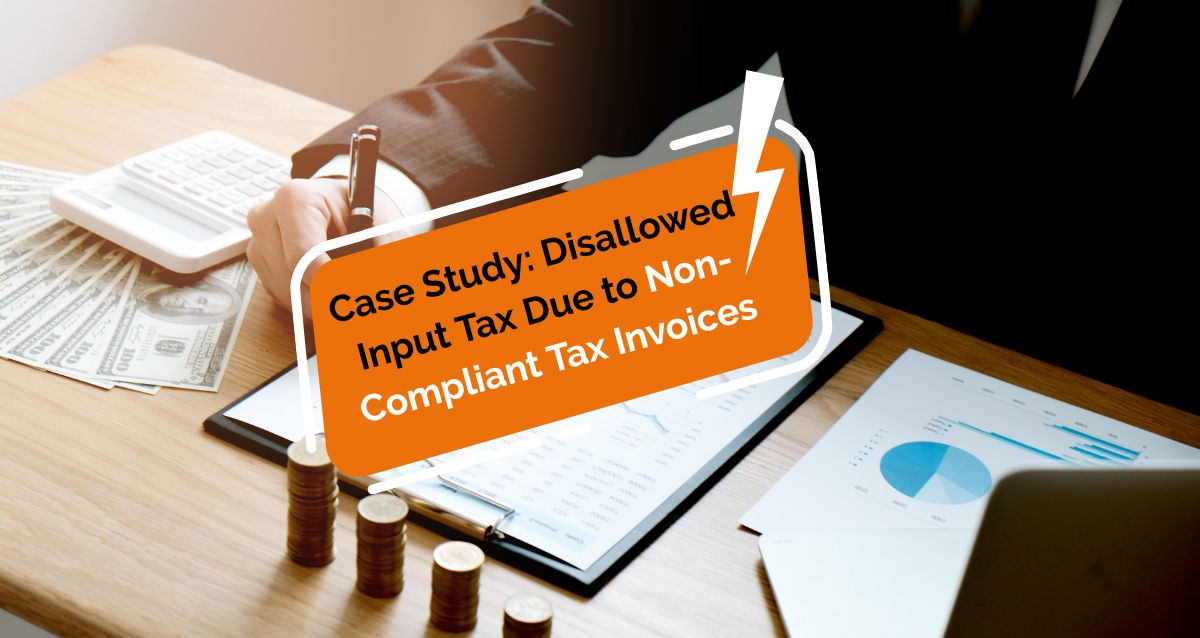Case Study: Disallowed Input Tax Explained
UAE VAT law permits registered businesses to claim input VAT that is spent on business purposes or making taxable supplies. The process of claiming the input VAT credit is at the time of filing the VAT returns. However, the Federal Tax Authority has a clear guideline for claiming the input VAT and strict documentation is mandated by the Law. Lack of sufficient tax invoice blocks the business from claiming the input VAT, and any such claim made can end up in non-compliance, administrative penalties and other legal actions.
In this case study, let us understand how a Dubai-based professional company lost their eligibility to claim input VAT due to the absence of proper documentation.
Background of the Company
Company Name: Ariston Legal Advisors FZ-LLC
Free Zone: Dubai Multi Commodities Centre (DMCC)
Business Activity: Legal consultancy and arbitration services
Annual Turnover: AED 9.6 million
VAT Registration: Effective since 2018
Artison Legal Advisors render high-end legal services to clients located in the UAE as well as outside the UAE. In order to cater for the clients, they engage third-party service providers from different industries, like consultants, IT service providers, training institutions, etc., who are located around the globe, including the UAE.

Objective
The finance team at Ariston aimed to:
- Get the credit for input VAT spent while obtaining third-party services.
- Maintain clean and readily available VAT records for future audits.
- Make sure that the business is compliant with the documentation rules specified in Articles 59-61 of the UAE VAT Executive Regulations.
Legal Reference: Tax Invoice Requirements
1) Under Article 59 of the VAT Executive Regulations, a valid tax invoice must contain:
- The invoice must display the words " Tax Invoices"
- The name, address and TRN of the service provider.
- Date of invoice and unique invoice number
- Name, address and TRN ( if applicable) of the recipient of goods or services.
- A clear description of goods supplied or services provided
- The amounts which are subject to VAT, the VAT rate and the amount of VAT charged.
2) Tax invoices are required to be obtained as follows;
- A simplified tax invoice suffices if the amount of the invoice is less than AED 10,000
- A full tax invoice is mandatory if the amount of the invoice is more than AED 10,000
- To claim input VAT, Customer TRN is mandatory if the VAT amount in the tax invoice exceeds AED 10,000 ( Supply amount AED 200,000)
Failure to document the tax invoice in the manner prescribed can lead to non-eligibility to claim the input VAT.
FTA Public Clarifications (e.g., VATP003 and VATP008) further emphasise the importance of correct invoice formatting.
What Went Wrong
Artison submitted the VAT return for the Quarter January to March 2025, claiming AED 145,000 as input VAT. While doing the internal review, they find out several mistakes in the Tax Invoices received from suppliers and input tax claimed, which are as below;
a) Out of the total 22 supplier tax invoices received, 6 invoices had no display of the words "Tax Invoice"
b) In 3 Invoices, the TRN of the supplier were missing.
c) Some services received from providers located overseas were not accounted for properly under the Reverse Charge Mechanism (RCM)
d) Certain invoices were for Taxable Supplies and Exempt supplies, which were not categorised and apportioned properly.
Despite paying VAT to the suppliers, the company lacked in documenting the proper tax invoices as per the FTA requirements.
FTA Audit and Findings
When the company was selected for a routine desk audit, the FTA requested supporting invoices for all claimed input VAT in Q1 2025. As a result, the following outcomes were observed:
- AED 52,000 of the claimed input VAT was disallowed.
- The firm was unable to rectify the missing details after the invoices were issued, as backdating or reissuing them is not permitted.
- FTA issued a notice for corrections, mentioning the non-eligible input VAT required to be adjusted in the subsequent quarter VAT filing.
- A penalty of AED 10,400 (20% of the disallowed amount) was levied under Cabinet Decision No. 75 of 2023.
Financial and Operational Impact
- Total VAT disallowed: AED 52,000
- Administrative penalties: AED 10,400
- Time cost: The finance team's effort to sort, match and revalidate documentation, which took 2 weeks.
- High scrutiny and delay in processing the future VAT refund request due to the ongoing audit review.

Lessons Learned
1. Invoice formatting is not optional
While paying VAT correctly is the primary condition, retaining a compliant tax invoice is equally important.
2. Self-checks are critical
Any sort of taxable expenses, before claiming in the VAT return, businesses must verify the validity of the Tax Invoice. Especially for the recurring expenses like rent, marketing, and outsourced services.
3. Reverse charge needs to be accounted for and reported properly
Import of services is considered as taxable supplies and it required to be reported in the VAT return and deducted from the eligible import of services under RCM.
4. FTA penalties apply even if it's a documentation issue
While claiming the non-eligible input VAT intentionally is considered as fraud activity and poor documentation unintentionally is subject to administrative penalties, the result of both is the disallowance of such input VAT.
Corrective Actions Taken
Ariston implemented the following measures after the incident:
- Implemented an invoice compliance checklist, which has to be reviewed before submitting the VAT return
- Communicated to all regular suppliers regarding the discrepancies in the invoices they issued and instructions given to issue the tax-compliant invoices in future.
- Made a checklist for cross-verifying the import of services before filing the VAT return.
- Appointed an FTA-approved Tax Agency to handle the future VAT matters, including return filings.
- Initiated a Voluntary disclosure for the quarter where the tax report was incorrect due to the evidence and reporting.
Ongoing Compliance Strategy
The company now:
- Keeps a digital archive of verified Tax Invoices
- Implements systems for monthly reconciliation of VAT with relevant documents and finance data
- Uses ERP, which flags to block entering the non-compliant Tax Invoices in the system
- Trains the internal teams on the standard documentation system to align with VAT requirements
How Flying Colour Tax Consultant Can Help?
Whether you're a startup or a well-established business, Flying Colour Tax Consultant offers tailored support in:
- Reviewing the documents before claiming the input VAT
- Implementation of a robust system for invoice compliance processes
- Preparing for FTA audits and responding to notices
- Filing Voluntary Disclosures and Penalty Mitigation
Disclaimer: The company names and details mentioned in this case study are fictional and have been created solely for illustrative and educational purposes. Any resemblance to real entities is purely coincidental.
To learn more about Case Study: Disallowed Input Tax Due to Non-Compliant Tax Invoices, book a free consultation with one of the Flyingcolour team advisors.
Disclaimer: The information provided in this blog is based on our understanding of current tax laws and regulations. It is intended for general informational purposes only and does not constitute professional tax advice, consultation, or representation. The author and publisher are not responsible for any errors or omissions, or for any actions taken based on the information contained in this blog.


